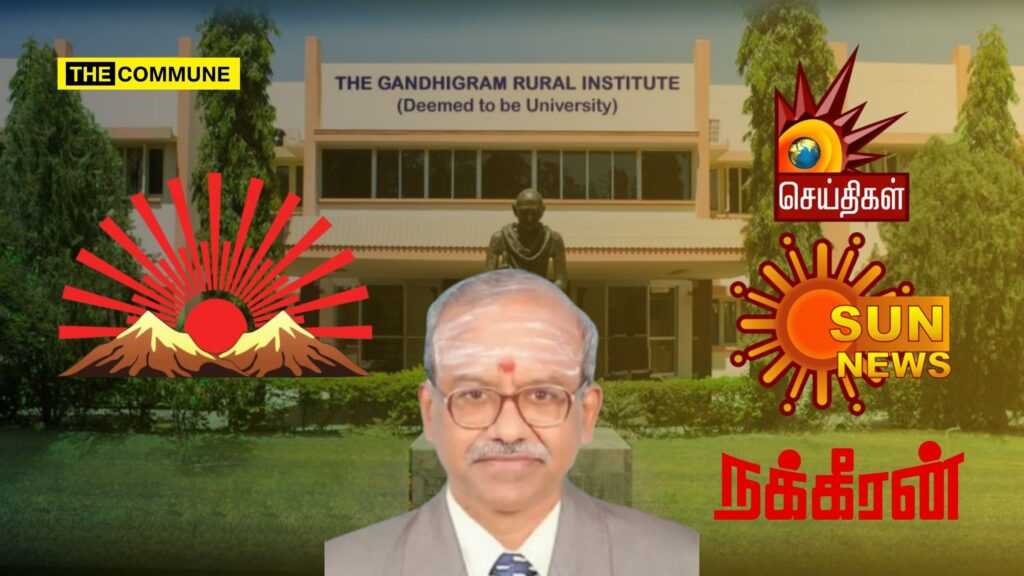Dr. Renganathan, a Health Officer in the Department of Rural Health and Sanitation at Gandhigram Rural Institute (GRI), Dindigul, has become the target of intense political and media attacks. These attacks, reportedly orchestrated by local DMK politicians and Dravidianist media, come in response to his efforts to expose institutional irregularities and push for reforms under the National Education Policy (NEP) 2020.
The Alleged Irregularities Flagged By Dr. Renganathan
Dr. Renganathan raised concerns about financial mismanagement in executing a sanitation contract at Gandhigram Rural Institute. According to his observations, Mr. Joseph Christopher, a temporary Health Inspector in the Department of Rural Health and Sanitation, was responsible for supervising contract sanitation workers, procuring materials, calculating overtime, and managing recruitment. However, Dr Renganathan alleged that lapses in oversight led to resource wastage and misappropriation of funds, with kickbacks allegedly funnelled to ruling party politicians.
He had also demanded the introduction of biometric attendance systems to promote transparency, the establishment of a permanent surveillance system to monitor the execution of contracts, the appointment of independent auditors to review sanitation and other critical services at the college and the conducting of an impartial investigation into the alleged irregularities.
Escalation And Political Targeting
The situation intensified after Dr Renganathan reported these concerns to higher authorities. In retaliation, Mr Joseph Christopher allegedly orchestrated a gherao on 12 November 2024 at the department premises. Shortly after, on November 18, Christopher reportedly organized a larger demonstration on campus involving students from the Sanitary Inspector program and external political groups, including DMK and Viduthalai Chiruthaigal Katchi (VCK).
This effort coincided with a media campaign accusing Dr Renganathan of promoting the NEP, Sanskrit, yoga, multilingualism, and “Hindu nationalist” ideologies in a bid to deflect from the original issue of alleged irregularities in the Gandhigram Rural Institute.
The Role Of Dravidianist Media
Prominent Dravidianist media outlets such as Sun News, Kalaignar News, and Nakkheeran launched a smear campaign against Dr. Renganathan. Their reports alleged he was promoting casteism, discriminatory practices, and the NEP—charges he vehemently denies.
For instance, he had tasked students with analyzing socio-political issues like alcohol prohibition, caste politics, the two-language policy, and the role of TASMAC in Tamil Nadu’s alcohol economy. His criticism of TASMAC’s ₹50,000 crore revenue target and his use of speeches by public figures, including Tamil Nadu Governor RN Ravi, became a plank for them to politically target him.
In a particularly egregious example, Nakkheeran accused Dr. Renganathan of making inappropriate remarks during classes on human reproductive biology—allegations he categorically refuted as baseless. According to Dr. Renganathan, these accusations stemmed from a deliberate misrepresentation of his academic discussions on family planning and human reproductive biology, to malign his reputation.
Political Intrusions And Threats
In what seems like an attempt to put pressure on the institution and the faculty, local DMK politicians, staged protests and demanded Dr. Renganathan’s suspension. On one occasion, a DMK delegation, accompanied by party-affiliated student wing members, visited the campus to pressure administrators. The DMK delegation was granted access to the campus, where they met with senior administration officials, including the Registrar. They complained that he was speaking in favour of Sanatana Dharma (Hindu thoughts) and acting favourable to BJP-RSS while dissing Dravidian Model among students.
Adding to the pressure, the delegation held a press conference on campus, presenting a one-sided narrative accusing him of discriminatory behavior. This external interference deepened the institutional crisis, with the administration caught between political pressure and mounting media scrutiny.
Dr. Renganathan reported threats to his life, allegedly from individuals linked to the political network behind the smear campaign. He has since filed multiple complaints with GRI authorities, requesting increased security and a thorough investigation.
While several faculty members rallied behind Dr. Renganathan, advocating for transparency and academic freedom, others expressed fear of political retaliation. The intimidation tactics, including labeling him a “Sanghi” (a term used in Tamil Nadu to derogatorily imply BJP alignment), underscored the political undertones of the campaign against him.
Dr. Renganathan does command respect and shares a good rapport among his students. A Muslim girl student had shared how Dr. Renganathan’s classes and life lessons on home budgeting, time management, Tamil literature, election manifesto analysis, had broadened her understanding. In fact, she had shared that Dr. Renganathan encouraged Tamil medium students to express their thoughts and write in Tamil.
Growing Political Pressure
As noted above, the DMK had already mobilized and turned up at the institute to put political pressure to take action against Dr. Renganathan. Interestingly, even the Viduthalai Chiruthaigal Katchi (VCK) seemed to express disdain over Dr Renganathan’s actions. The Dindigul district party authorities published a poster where they called him a “Sanghi”.
Renganathan’s Alleged Crime
Dr Renganathan has rigorously implemented the National Education Policy (NEP) 2020 core principles at GRI. He encouraged students to critically analyze sensitive societal issues, including caste dynamics, alcohol policies, and multilingualism. These intellectual explorations, designed to foster analytical thinking, were mischaracterized as political propaganda aligned with BJP ideology.
By framing his actions as politically motivated, his detractors aimed to stifle academic freedom, suppress critical thinking, and control institutional narratives. The coordinated efforts to discredit him reflect a broader trend of suppressing academic dissenting voices.
Subscribe to our channels on Telegram, WhatsApp, and Instagram and get the best stories of the day delivered to you personally.

